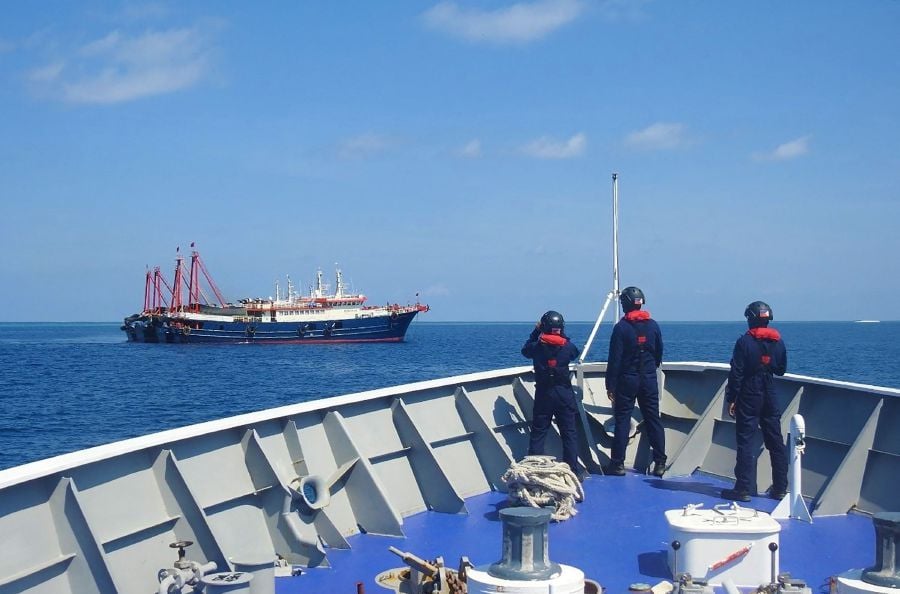THE potential for an unintended conflagration between disputants in the South China Sea (SCS) conflict and it triggering a regional military clash, or worse, seems to loom larger than ever before. A patient diplomatic approach, which always seems to fall deaf on Chinese ears, is starting to fray at the edges.
This was recently exemplified when Chinese boats were discovered inside the Philippines Exclusive Economic Zone, prompting the Philippine foreign minister to fire off an expletive-filled Twitter message demanding they leave immediately. It also led to the US State Department reminding Beijing that an armed attack would trigger United States obligations under its mutual defence treaty with the Philippines.
There is an even uglier scenario, of the Chinese military invading Taiwan. This was once thought to be very unlikely, but military analysts and planners now increasingly think it is not beyond the realms of possibility -— if that were to happen and America were to come to Taiwan's defence, the consequences would be potentially devastating.
For now, the epicentre of great power rivalry between China and America is and will remain— at least into the foreseeable future — the Indo-Pacific, with the most likely flashpoint being the SCS.
Southeast Asian leaders have pinned their hopes on Asean successfully concluding negotiations with China on a Code of Conduct (COC) for the SCS. Yet, years of talks have been incessantly stalemated.
There are concerns that even if an agreement is eventually inked, it won't prove to be effective since it is unclear how disagreements over the interpretation of the COC could be resolved, neither is there any guarantee it would be legally binding.
Unfortunately, all these years of diplomatic efforts could prove, in the end, to have been a colossal waste of time. In fact, if we look at Beijing's actions, not just its words, does the Chinese government really want to reach an accord with Asean? There are reasons to be sceptical.
As a prima facie argument, China has claimed that it has historical rights to the SCS. This has been fully rejected throughout the international community. But, taking that aside, even if the underlying reason for Beijing's behaviour is truly about feeling it has a valid claim, consider its behaviour in Indonesia.
Beijing certainly has no historical claims in the waters of Indonesia, yet it has continued over the years to enter Indonesian waters illegally and make spurious arguments.
For example, while I was coordinating minister for maritime affairs during President Joko Widodo's first term in office, China lodged protest with the Indonesian government because of my efforts to rename the waters northeast of the Natuna Islands, at the far southern end of the SCS, the "North Natuna Sea".
China has no right to lodge a protest. China berates its neighbours whenever we criticise them for contentious issues, such as the plight of the Uighurs, telling us we should not meddle in their domestic affairs. And yet when it comes to our sovereign rights, they not only meddle but also incessantly break the law.
Another example, the Chinese Coast Guard and fishing vessels illegally entered the North Natuna Sea, first in 2016, again in 2019 and more recently in September last year, offering the excuse, which is totally indefensible by any standard, that they have traditional fishing rights in those waters.
In January, a Chinese survey ship was also caught in Indonesian waters, in the strategic Sunda Strait, and on several occasions, Chinese-made underwater spy drones were arrested in the Malacca Strait and near the straits of Sunda and Lombok.
These reveal a larger game plan at play, one of a more insidious nature than is being admitted by China's leaders. These straits are critically strategic routes, literally the gateway through which oil coming from the Middle East goes to East Asia.
Obviously, Chinese military strategists would have a keen interest in the intelligence coming from survey ships and underwater spy drones in Indonesian
waters.
Of course, the Indonesian government protested to Beijing about these intrusions. Unfortunately, they were not as strong as they should have been — as with many of Asean's politicians, most of the time we mildly protest out of fear of losing out on the economic benefits of stable relations with China.
Going soft on China and pinning our hopes on diplomacy have gotten Asean nowhere. Our sovereign rights continue to be compromised, and if we take a hard look at how China has proven its word can't be trusted, then it becomes obvious a harder line has to taken, regardless of the risks of Beijing showing its displeasure by slapping sanctions on its critics.
All of Asean should take notice of the Philippines saying enough is enough and demanding, in no uncertain terms and as loudly as possible, that China stays out of its waters. All of us should be doing the same.
The writer is former Indonesian coordinating minister for maritime affairs
















